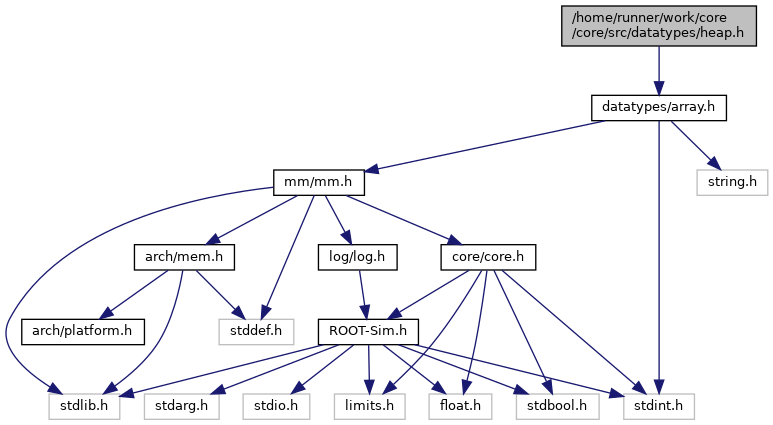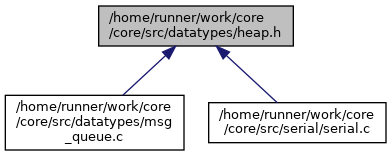 |
ROOT-Sim core
3.0.0-rc.2
A General-Purpose Multi-threaded Parallel/Distributed Simulation Library
|
 |
ROOT-Sim core
3.0.0-rc.2
A General-Purpose Multi-threaded Parallel/Distributed Simulation Library
|
Heap datatype. More...
#include <datatypes/array.h>

Go to the source code of this file.
Macros | |
| #define | heap_declare(type) dyn_array(type) |
| Declares a heap. More... | |
| #define | heap_items(self) array_items(self) |
| Gets the underlying actual array of elements of a binary heap. More... | |
| #define | heap_count(self) array_count(self) |
| Gets the count of contained element in a heap. More... | |
| #define | heap_init(self) array_init(self) |
| Initialize an empty heap. More... | |
| #define | heap_fini(self) array_fini(self) |
| Finalize a heap. More... | |
| #define | heap_is_empty(self) array_is_empty(self) |
| Check if a heap is empty. More... | |
| #define | heap_min(self) (*(__typeof(*array_items(self)) *const)array_items(self)) |
| Get the highest priority element. More... | |
| #define | heap_insert(self, cmp_f, elem) |
| Insert an element into the heap. More... | |
| #define | heap_insert_n(self, cmp_f, ins, n) |
| Insert n elements into the heap. More... | |
| #define | heap_extract(self, cmp_f) |
| Extract an element from the heap. More... | |
Heap datatype.
A very simple binary heap implemented on top of our dynamic array
| #define heap_count | ( | self | ) | array_count(self) |
Gets the count of contained element in a heap.
| self | the target heap |
| #define heap_declare | ( | type | ) | dyn_array(type) |
Declares a heap.
| type | the type of the contained elements |
| #define heap_extract | ( | self, | |
| cmp_f | |||
| ) |
Extract an element from the heap.
| self | the heap from where to extract the element |
| cmp_f | a comparing function f(a, b) which returns true iff a < b |
For correct operation of the heap you need to always pass the same cmp_f both for insertion and extraction
| #define heap_fini | ( | self | ) | array_fini(self) |
Finalize a heap.
| self | the heap to finalize |
The user is responsible for cleaning up the possibly contained items.
| #define heap_init | ( | self | ) | array_init(self) |
Initialize an empty heap.
| self | the heap to initialize |
| #define heap_insert | ( | self, | |
| cmp_f, | |||
| elem | |||
| ) |
Insert an element into the heap.
| self | the heap target of the insertion |
| cmp_f | a comparing function f(a, b) which returns true iff a < b |
| elem | the element to insert |
For correct operation of the heap you need to always pass the same cmp_f, both for insertion and extraction
| #define heap_insert_n | ( | self, | |
| cmp_f, | |||
| ins, | |||
| n | |||
| ) |
Insert n elements into the heap.
| self | the heap target of the insertion |
| cmp_f | a comparing function f(a, b) which returns true iff a < b |
| ins | the set of elements to insert |
| n | the number of elements in the set |
For correct operation of the heap you need to always pass the same cmp_f, both for insertion and extraction
| #define heap_is_empty | ( | self | ) | array_is_empty(self) |
Check if a heap is empty.
| self | the heap to check |
self heap is empty, false otherwise | #define heap_items | ( | self | ) | array_items(self) |
Gets the underlying actual array of elements of a binary heap.
| self | the target heap |
You can use the returned array to directly index items, but do it at your own risk!
| #define heap_min | ( | self | ) | (*(__typeof(*array_items(self)) *const)array_items(self)) |
Get the highest priority element.
| self | the heap |